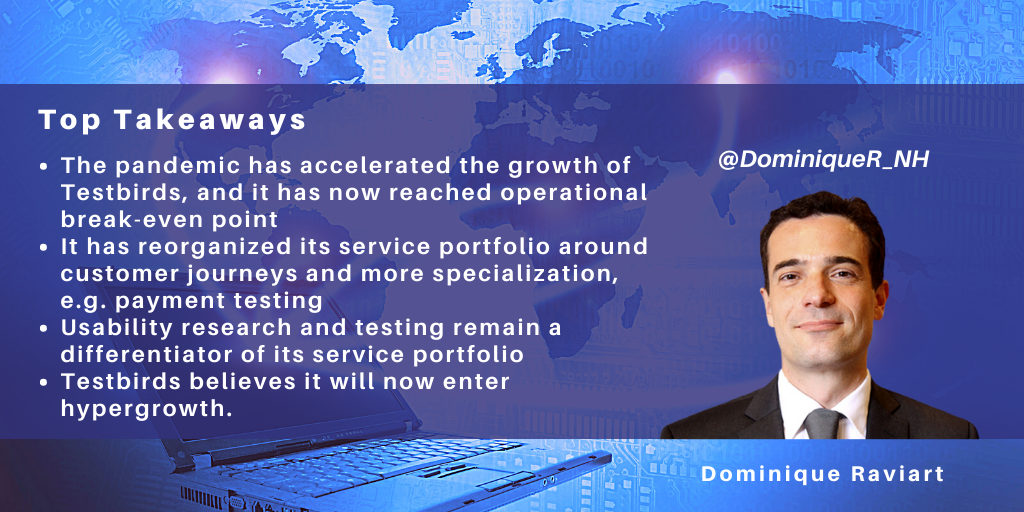Search posts by keywords:
Filter posts by author:
Related NEAT Reports
Other blog posts
posted on Sep 02, 2022 by Dominique Raviart

We recently talked to Testbirds, the largest Europe-headquartered crowdtesting firm, founded in 2012. We found Testbirds upbeat after the pandemic. The company had an excellent year in 2020, achieving revenue growth of 30% as organizations, challenged by closed offices, turned to Testbirds to conduct crowdtesting of their digital initiatives. This was followed by another excellent year in 2021, with revenue growth reaching 40%, led by digital projects, and Testbirds is expecting similar growth for this year. In parallel to this continuing sales momentum, Testbirds has reached operational breakeven and is currently funding its expansion organically. The company continues to recruit and now has ~600k crowdtesters in its community.
Expansion in Europe, Now Targeting U.S.
Expansion remains a priority for the company, which is increasing its office locations in Europe with new facilities in Leipzig and London, complementing its existing presence in Germany and the Netherlands, and to a smaller extent in France and Italy. Testbirds is structured into regional hubs, Leipzig and London being sales and project management centers serving clients in the German and English languages respectively. London is also a hub for project management, delivery, and sales and marketing activities to the U.S.
In addition to its direct sales activity, Testbirds wants to grow its indirect channel, increasing the level of work with partners. The company recruited a channel head in 2020 and expects its indirect channel to contribute revenues in 2022.
More Consulting and Specialized Services
Testbirds highlights that its indirect channel strategy will somewhat change its value proposition as partners will deliver the crowdtesting project management and analysis work themselves. Consequently, Testbirds has already changed its portfolio. In addition to offering crowdtesting project management and execution, the company is also now highlighting capabilities such as consulting and methodologies for advising clients on their crowdtesting goals and approaches. With this consulting-led service, Testbirds looks to accompany clients across their digital product journey. It has aligned its service portfolio around consulting, from defining a digital product concept to prototyping, development, testing, and release.
Beyond its consulting approach, Testbirds has expanded its offering beyond quality assurance and usability testing to online surveys, market research, and customer feedback. While QA remains core to its value proposition, the company is expanding in usability research and testing.
Testbirds highlights the specialized offerings of its Testbirds Exclusives brand. It recently launched its payment testing service, addressing online, offline, and in-store PoS. The company has set up a dedicated offering that can be provided on a standalone basis, focusing on European regulations on authentication or, more broadly, covering the customer journey, from product order to payment and returns management.
Alongside payment, Testbirds is promoting its offering verticalization, usually in the field. Examples include connected home equipment testing or EV charging station testing. Usability testing plays a key role in such verticalization.
Incremental Automation
Testbirds continues to invest in the Nest, its platform used by crowdtesters, its project managers, and clients. A recent example of incremental functionality is its companion app, which allows crowdtesters to log defects and screenshots directly from their mobile devices. The companion app simplifies crowdtesters’ work by avoiding going through a PC to log defect screenshots.
The company continues to invest in AI, using ML for mining defect comments and classifying defects into categories. It continues its work around defect prediction and automatically transcribing video voice into transcripts. While we initially expected AI to bring automation and efficiencies to crowdtesting, Testbirds finds that deploying AI use cases has been slower than expected.
So what’s next for Testbirds?
The company believes it has reached the inflection point where demand will move to hypergrowth. It has hired sales executives and counts on its indirect channel to grab this rising demand. The company has reorganized its service portfolio, driving specialized services. In parallel, Testbirds believes it has structured its execution to make its service repeatable. The company also pushes defect analysis work to its community through the Bird+ program to drive efficiencies. Finally, Testbirds is now opening again to further private equity funding. The company believes it will enter a hypergrowth cycle and external funding will help scale up.
